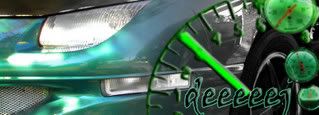Ok so I am still saving for boost and am learning everything I can in the mean time and I was reading up on tuning and i wont be getting HPT for a while after and was wondering how people tune their cars to keep things from getting F*&^%$ up. What kind of places do this? Do it yourself? What? so if anybody could shed some light on this for me that would be great. Thanks!

A lot of dyno shops will tune for you, for a price.
Lots of people used the Vortech 4:1 Fuel Pressure Regulator before HpT came out.
Make sure you have a wideband o2 gauge before trying to tune.

Dyno tuning usually addresses wide open throttle. Some dynos with a brake can address part throttle driveability issues. It comes with a pricetag, usually in the hundreds of dollars per hour range. If you're looking to tune on the dyno I'd recommend finding a shop that will let you rent one for a day or a half day, and try to find a local guy (not necessarily a dyno shop employee) who's fairly good to do the tuning. At least you should end up fairly close that way.
Tuning by yourself imo takes time and patience. I like to leave the tuning setup in the car, cables hanging out, WB installed, all ready to throw the laptop in and go. If you're just adding boost to a stock engine you've got it easy. The car should start and run without too much effort. If you're re-scaling tables and changing the injector constant, do that before firing up the car. After that, it's a matter of driving the car, looking for something that isn't right, and figuring out what to do to fix it. The more you drive the car, the better you get at spotting issues that could be improved.
I'd recommend the following.
1) Once the car is up and running, try not to make too many changes at once. One or two wrong changes can affect more than you expected it to and you might not know which changes to undo.
2) Keep notes. Things like "removed spark from PE due to knock" can be valuable over time. Looking over your notes can tell you if you're having a mechanical issue before it happens. For example, if you notice that you keep pulling timing to reduce knock, it might mean you're running lean due to a failing fuel pump or clogged filter or even that you have a single injector failing.
3) Datalog. Lots and lots of datalogging is good. Spend time looking through the logs learning how to "read" what the engine is doing. You can see knock on a datalog before you can hear it. You can watch for lean O2 readings before they cause major problems. You can improve throttle response, fuel mileage, and WOT performance better by watching the logs than by seat of the pants tuning. You can try "what if" tunes to learn what does and doesn't help the car and you can even notice things like "my bigger than a small island intercooler is really only heating up my intake charge in summer traffic."
4) Each time you have a tune that is better than the last, save it with a new name. It's possible to get completely lost when chasing a problem and get things so messed up it's not worth it to change them back. It's also possible for a variable which you can't change to be affected by data corruption and cause problems. Always, always save the "last best tune" so you can go back to it and start again. I save all my tunes. I have files from 8 and 9 years ago.
5) If you can, plan to have another ride just in case. It takes a bunch of pressure off you if you don't have to have the car running to get to work or school the next day. Some problems require you to walk away from the car for a bit. It's easier to do if you can park it for a day or two.
6) Most important, don't let the amount of variables to mess with get to you. Anyone can do it if they're careful and patient.
-->Slow


